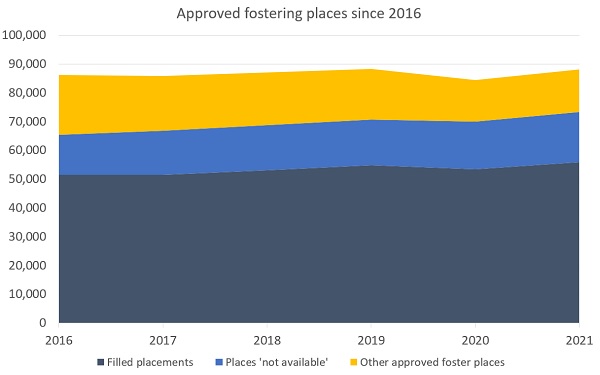
England’s care system needs an “urgent boost to the number of foster carers” to avoid reaching “breaking point”.
That was the warning from Ofsted as it released its annual fostering statistics last week, which showed there were 88,180 approved fostering places, 55,990 of which were filled, and 45,370 approved fostering households, as of 31 March 2021.
But despite the latter being a record figure, Ofsted said the statistics painted a “bleak picture”, with “too few carers with the right skills” to support the number of children needing a placement.
Over the past five years, the number of approved places and approved households have only increased by 2% while the number of children in placements rose by 9%.
Increases driven by family and friends carers
And this increase has been driven by a rise in family and friends carers, who are usually approved to care for specific children and the vast majority of whom do not offer other placements.
Over the past five years, the number of approved households whose primary placement offer was for family and friends care rose from 5,855 to 8,045. Discounting these, the number of approved fostering households decreased by 3% to 37,325, with no change in the number of placements primarily for permanent care and a fall in those for non-permanent care.
And of 8,880 households newly approved in 2020-21 and still active at the end of the financial year, 3,525 (40%) were family and friends carers.
These figures correlate with the government’s children looked after statistics for March 2020, which showed that the proportion of children in foster care not with a relative or friend had decreased to 57% from 60% in 2018.
Lucy Peake, chief executive of charity Kinship, said the figures showed that it was becoming “increasingly urgent” that the government recognises and values kinship care.
 ‘Bleak picture’
‘Bleak picture’
Ofsted’s figures also showed the effective capacity of the system had fallen over the past five years, with the number of vacant places plummeting from 21,160 to 14,005.
This was mainly due to the rise in filled places over this time, but it was also caused by the 3,525 rise in “not available” places, which reached 17,390 in 2021.
Yvette Stanley, Ofsted’s national director for social care, said the figures painted a “bleak picture”.
“[Year] on year we see more children coming into foster care, and too few carers with the right skills to give them the support they deserve. How long can this go on before the care system reaches breaking point?
“We rarely see children coming into care who don’t need to be, but with the right help earlier, some may be able to remain with their families. We also need to urgently boost the number of foster carers, making sure they, and the children they care for, get the right support.”
Related articles
Fewer enquiries leading to applications
Ofsted also highlighted the fact that the proportion of enquiries from prospective fostering households that led to applications has decreased in recent years.
While the number of enquiries from prospective fostering households increased by 57% to 160,635 from 2015-16 to 2020-21, .the number of applications only rose by 18% to 10,145.
This means the proportion of applications from enquiries decreased from 8% in 2015-16 to 6% in 2020-21.
A lower proportion of initial enquiries to independent fostering agencies (IFAs) converted to applications (4%) compared to local authorities (15%).
The proportion of fostering applications processed in the year that were approved also decreased, from 44% in 2015-16 to 32% in 2020-21.
Sixty five per cent of foster carers approved in the year to March 2021 were over 50 while 26% were over 65, both similar rates to the year before.
Directors call for ban on profit-making agencies
The Association of Director of Children’s Services (ADCS) said the figures showed government needed to invest in recruiting more foster carers.
“A wider pool of foster carers, who can meet the diverse needs of children and young people coming into care, will lead to greater placement choice, and as a result greater placement stability,” said Edwina Grant, chair of ADCS’ health, care and additional needs policy committee.
“However, without the support from national government this is becoming increasingly difficult as the number of children coming into care continues to rise.”
Grant also called for an end to “significant profits being made by a small number of organisations from fostering” and urged the care review to address this.
“Such practices cannot be justified, and we reiterate our call on government to introduce legislation, similar to that in Scotland, which prevents for-profit operations in this area,” she said.
Call on government to fund recruitment drive
Andy Elvin, chief executive of fostering charity TACT, also agreed that more foster carers were needed and called on central government to intervene by funding a national carer recruitment campaign.
Elvin alluded to his idea – proposed for consideration by the care review – of a “national care family”, where responsibility for recruitment of foster carers would be taken out of councils’ hands.
“152 local authorities working separately are never going to join up effectively to do this. We need to move towards larger regional and/or national structures to operate the care system and take responsibility for adopter and foster carer recruitment,” he said.
The network said the increases in carers reported by Ofsted fell short of what was needed to meet demand.
‘Children should be listened to’
It previously estimated that 7,300 more foster families were needed in England when considering the specific need for households willing to care for teenagers, sibling groups, disabled children, and unaccompanied asylum-seeking children.
Katharine Sacks-Jones, Become’s chief executive, said the recruitment of carers had to be specific to children’s needs.
“Children need foster carers who can welcome sibling groups to prevent young people’s trauma being deepened through further separation,” she said.
“They need foster carers in their local area to enable them to retain the relationships and links to the communities which matter to them.
“Children and young people in care should always feel their thoughts are listened to and acted on where possible during the process of matching them with suitable foster carers”.
More recruitment ‘could be costly’
However, Harvey Gallagher, chief executive of the Nationwide Association of Fostering Providers (NAFP), said simply recruiting more foster carers could be costly and inefficient
“If it were possible to recruit many more foster carers to offer more choice for children, we would have to be willing as a society to fund vacancies,” he said.
“Foster care, as well as being a vocation, is also income for foster carers to be able to pay their bills, and they only receive fees when a child is living with them.”
Gallagher called for better support for children in placements and also said tackling poverty and poor mental health in families could ease demand on the care system.
‘Not everyone can be a foster carer’
He defended IFAs’ lower rate of applications resulting from enquiries about being a foster carer.
“Not everyone is suited to being a foster carer, so IFAs undertake a stringent process when speaking with anyone enquiring about being a foster carer,” he said.
A spokesperson for the DfE said: “Local authorities are responsible for all children in care in their area, including those in foster care.
“We have made significant additional funding available in response to changing pressures on children’s services and we are investing in different approaches to help councils provide foster care places, including through digital tools that make it easier to match children with foster carers, and by trialling different ways to plan placements.”
- Ofsted’s figures showed a sharp in increase in approved households and places over the past year, but the inspectorate said this was partly due to a reduced number of agencies submitting data for 2019-20 amid the beginning of the Covid-19 outbreak last year.




 Bournemouth, Christchurch and Poole
Bournemouth, Christchurch and Poole  Hampshire County Council
Hampshire County Council  Oxfordshire County Council
Oxfordshire County Council  South Gloucestershire Council
South Gloucestershire Council  Wokingham Borough Council
Wokingham Borough Council  Webinar: building a practice framework with the influence of practitioner voice
Webinar: building a practice framework with the influence of practitioner voice  ‘They don’t have to retell their story’: building long-lasting relationships with children and young people
‘They don’t have to retell their story’: building long-lasting relationships with children and young people  Podcast: returning to social work after becoming a first-time parent
Podcast: returning to social work after becoming a first-time parent  How managers are inspiring social workers to progress in their careers
How managers are inspiring social workers to progress in their careers  Workforce Insights – showcasing a selection of the sector’s top recruiters
Workforce Insights – showcasing a selection of the sector’s top recruiters 

 Facebook
Facebook X
X LinkedIn
LinkedIn Instagram
Instagram
Comments are closed.